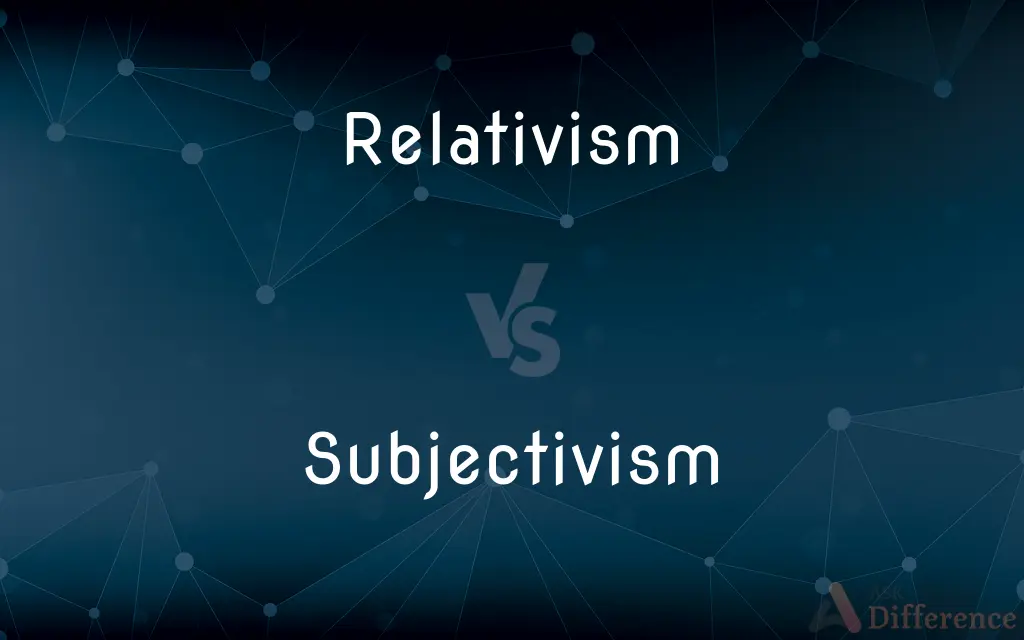Relativism vs. Subjectivism — What's the Difference?
Edited by Tayyaba Rehman — By Fiza Rafique — Updated on October 5, 2023
Relativism is a truth change per context and perspective. Subjectivism is a truth is subjective and individual-based.

Difference Between Relativism and Subjectivism
Table of Contents
ADVERTISEMENT
Key Differences
Relativism posits that the truth and moral values are not absolute but change with the cultural, social, or personal context. Subjectivism, on the other hand, insists that truth and morality are purely subjective and reside within personal perspectives.
In the case of Relativism, different cultures might possess distinct moralities that are all valid within their own respective contexts. Whereas Subjectivism signifies that the individual's viewpoint is the determinant of their moral truth and it may not necessarily be recognized by others.
Relativism provides a framework that allows various cultures to uphold their distinct moral codes without infringing upon each other’s views as it recognizes the legitimacy of different perspectives. Subjectivism could be viewed as potentially isolating since it places the truth within the individual, potentially ignoring collective or cultural wisdom.
In philosophical discourse, Relativism often opens up dialogues about cultural understanding and mutual respect. In contrast, Subjectivism tends to pave the way for discussions about personal autonomy, individual rights, and self-determination.
Critics argue that Relativism might inadvertently endorse morally reprehensible practices if they’re culturally sanctioned. Simultaneously, critics of Subjectivism suggest that it could lead to moral chaos, as it allows every individual’s viewpoint to stand as their own “truth."
ADVERTISEMENT
Comparison Chart
Basis of Truth
Based on cultural or social consensus.
Derives from individual perspectives.
Moral and Ethical Grounding
Can have a collective or cultural foundation
Grounded solely in individual belief.
Application in Ethics
Might uphold collective moral standards.
Upholds individual moral standards.
Criticisms
Can inadvertently validate harmful practices
Might lead to moral anarchy.
Societal Impact
Encourages cultural tolerance.
Encourages individual moral autonomy.
Compare with Definitions
Relativism
Relativism suggests that truth is variable and dependent on context.
In relativism, what's moral in one society might be immoral in another.
Subjectivism
Subjectivism asserts that truth is contingent upon individual beliefs and perspectives.
Subjectivism emphasizes the prevalence of personal belief over universal truths.
Relativism
Relativism affirms that moral codes and truths are crafted by societal and cultural norms.
Relativism reflects on how historical contexts shape moral and ethical norms across societies.
Subjectivism
Subjectivism allows for the coexistence of conflicting truths within different individuals.
Subjectivism appreciates that divergent beliefs, even if conflicting, can all be individually valid.
Relativism
Relativism argues that different cultures, societies, and individuals possess their own valid truths.
Through the lens of relativism, diverse ethical practices are respected and acknowledged.
Subjectivism
Subjectivism maintains that experiences and perceptions of truth are inherently personal.
According to subjectivism, individuals might perceive the same event in disparate ways, each holding their own truth.
Relativism
Relativism posits that no standpoint is uniquely privileged over others.
Relativism allows multiple truths to coexist harmoniously within different contexts.
Subjectivism
Subjectivism posits that moral claims reflect personal attitudes rather than objective realities.
In subjectivism, my personal ethical stance is not subject to external validation.
Relativism
Relativism can be expressed in cultural, moral, and epistemic forms, each delineating a particular domain where truths are contingent upon varying factors.
Cultural relativism explores how practices are bound to the moral frameworks of respective cultures.
Subjectivism
Subjectivism is the doctrine that "our own mental activity is the only unquestionable fact of our experience", instead of shared or communal, and that there is no external or objective truth. The success of this position is historically attributed to Descartes and his methodic doubt, although he used it as an epistemological tool to prove the opposite (an objective world of facts independent of one's own knowledge, ergo the "Father of Modern Philosophy" inasmuch as his views underlie a scientific worldview).
Relativism
Relativism is a family of philosophical views which deny claims to objectivity within a particular domain and assert that facts in that domain are relative to the perspective of an observer or the context in which they are assessed. There are many different forms of relativism, with a great deal of variation in scope and differing degrees of controversy among them.
Subjectivism
The quality of being subjective.
Relativism
The theory that value judgments, as of truth, beauty, or morality, have no universal validity but are valid only for the persons or groups holding them.
Subjectivism
The doctrine that all knowledge is restricted to the conscious self and its sensory states.
Relativism
The theory, especially in ethics or aesthetics, that conceptions of truth and moral values are not absolute but are relative to the persons or groups holding them.
Subjectivism
A theory or doctrine that emphasizes the subjective elements in experience.
Relativism
A specific such theory, advocated by a particular philosopher or school of thought.
Subjectivism
Any of various theories holding that the only valid standard of judgment is that of the individual. For example, ethical subjectivism holds that individual conscience is the only appropriate standard for moral judgment.
Relativism
(philosophy) the philosophical doctrine that all criteria of judgment are relative to the individuals and situations involved
Subjectivism
(metaphysics) The doctrine that reality is created or shaped by the mind.
Subjectivism
(epistemology) The doctrine that knowledge is based in feelings or intuition.
Subjectivism
(ethics) The doctrine that values and moral principles come from attitudes, convention, whim, or preference.
Subjectivism
Any philosophical doctrine which refers all knowledge to, and founds it upon, any subjective states; egoism.
Subjectivism
(philosophy) the doctrine that knowledge and value are dependent on and limited by your subjective experience
Subjectivism
The quality of being subjective
Subjectivism
Subjectivism implies that an individual's moral standpoints are valid for them, regardless of collective perspectives.
Subjectivism can manifest as differing personal convictions about the morality of a single act.
Common Curiosities
How does Subjectivism view truth?
Subjectivism views truth as individual-based, deriving from personal beliefs and perspectives.
How might Subjectivism impact societal moral norms?
Subjectivism could challenge societal norms as it prioritizes individual beliefs and truths.
What are some criticisms of Relativism?
Critics argue that Relativism may unintentionally validate morally objectionable practices if they’re accepted within a culture.
What does Subjectivism say about personal experiences?
Subjectivism holds that personal experiences are valid and true for the individual experiencing them.
Can Relativism lead to moral confusion?
Yes, Relativism can be seen as enabling conflicting moral codes, potentially leading to ethical dilemmas.
How is Relativism applied in ethical discussions?
Relativism is often applied to appreciate and understand varied moral practices across different cultures.
Can Relativism and Subjectivism coexist?
Yes, though distinct, they can coexist as both reject objective, universal truths in favor of context-dependent truths.
Is Subjectivism self-centric?
Yes, Subjectivism centralizes the individual's beliefs as their personal truth, sometimes disregarding collective truths.
Can Subjectivism lead to disagreements?
Yes, Subjectivism can lead to disagreements since it validates individual truths which might conflict with others.
How does Relativism view cultural practices?
Relativism generally respects and validates different cultural practices as being true within their respective contexts.
What is the fundamental belief of Relativism?
Relativism believes that truth and morality vary across different contexts and perspectives.
Does Relativism support cultural diversity?
Yes, Relativism inherently appreciates and supports the legitimacy of cultural diversity.
Can Relativism be applied to scientific truths?
Typically, no. Relativism is often confined to ethical and cultural contexts, not empirical facts.
How does Subjectivism relate to personal autonomy?
Subjectivism strongly supports personal autonomy by upholding individual beliefs and truths.
Does Subjectivism imply isolation from collective truths?
Not necessarily, but Subjectivism allows individuals to hold truths that may diverge from collective or societal beliefs.
Share Your Discovery

Previous Comparison
Ascending vs. Descending
Next Comparison
Resemble vs. ReassembleAuthor Spotlight
Written by
Fiza RafiqueFiza Rafique is a skilled content writer at AskDifference.com, where she meticulously refines and enhances written pieces. Drawing from her vast editorial expertise, Fiza ensures clarity, accuracy, and precision in every article. Passionate about language, she continually seeks to elevate the quality of content for readers worldwide.
Edited by
Tayyaba RehmanTayyaba Rehman is a distinguished writer, currently serving as a primary contributor to askdifference.com. As a researcher in semantics and etymology, Tayyaba's passion for the complexity of languages and their distinctions has found a perfect home on the platform. Tayyaba delves into the intricacies of language, distinguishing between commonly confused words and phrases, thereby providing clarity for readers worldwide.















































